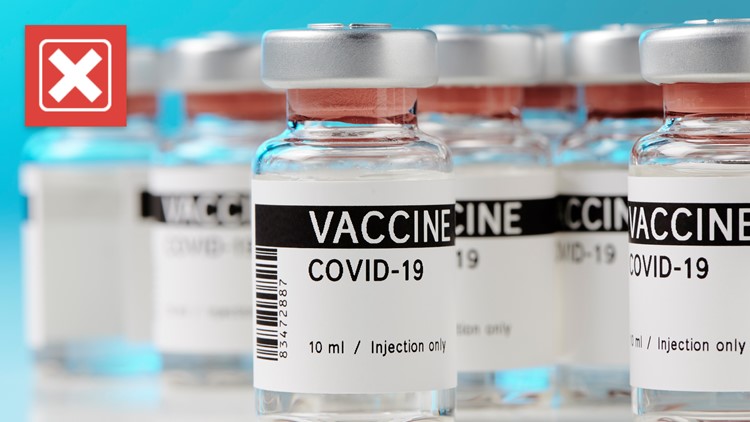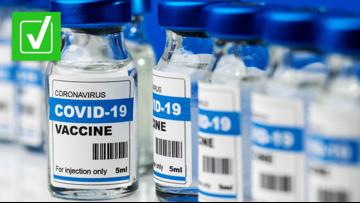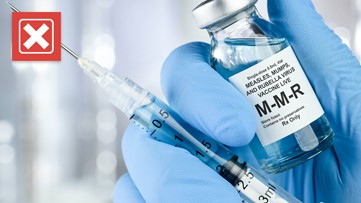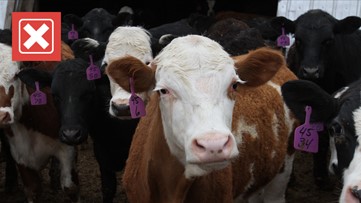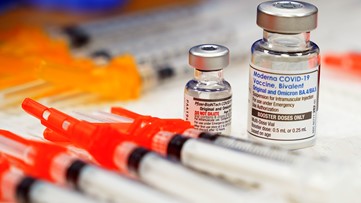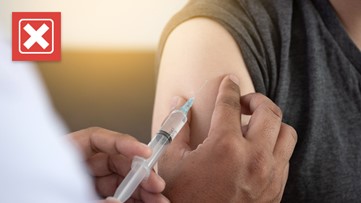The U.S. Food and Drug Administration announced on April 18 that the agency changed its emergency use authorizations for the Pfizer and Moderna COVID-19 vaccines.
This announcement led to confusion on social media. Some people also claimed in viral tweets that the FDA banned the COVID-19 vaccines.
“Last year you couldn’t enter a restaurant without a vaccine card. That same vaccine today is banned,” one person wrote on Twitter.
THE QUESTION
Did the FDA ban the Pfizer and Moderna COVID-19 vaccines?
THE SOURCES
- The U.S. Food and Drug Administration (FDA)
- Yale Medicine
- Andrew Pekosz, Ph.D., professor and virologist at the Johns Hopkins School of Public Health
- Payal Kohli, M.D., assistant clinical professor of medicine at the University of Colorado in the Department of Cardiology and founder of Cherry Creek Heart
THE ANSWER
No, the FDA did not ban the Pfizer or Moderna COVID-19 vaccines.
WHAT WE FOUND
The FDA can grant an emergency use authorization (EUA) or full approval to drugs and vaccines.
An emergency use authorization (EUA) makes a vaccine or drug available to the public before it’s approved by the FDA amid a public health threat like COVID-19. The full FDA approval process takes longer, and requires products like vaccines to meet more rigorous safety and efficacy standards.
Pfizer and Moderna’s original, or monovalent, COVID-19 vaccines received full FDA approval for people in certain age groups. But they were only available under an emergency use authorization for others, including young children.
The April 18 announcement from the FDA says the original Pfizer and Moderna COVID-19 vaccines are no longer authorized for emergency use for anyone. But they are still approved by the FDA. Health experts say the updated guidance doesn’t equate to a “ban” on the original vaccines.
In an effort to “simplify the vaccination schedule” for Americans, the FDA instead granted emergency use authorization to the updated bivalent vaccines for all doses given to people 6 months and older.
Bivalent vaccines target both the original strain of COVID-19 and the omicron subvariants BA.4 and BA.5. They are made using the same mRNA technology as the original Pfizer and Moderna vaccines.
The FDA doesn’t “ban” previously approved drugs or vaccines, as some online posts claim, virologist and Johns Hopkins School of Public Health professor Andrew Pekosz explained.
The federal agency can revoke a vaccine’s approval if later data calls into question its safety or effectiveness, he said. But that is not what happened with the monovalent COVID-19 vaccines.
In a tweet, the FDA said the monovalent vaccines are still approved and that “hasn’t changed.” What has changed is that the original shots are no longer authorized for emergency use.
“By saying they are still approved, they are reaffirming all the efficacy and safety data they obtained as valid,” Pekosz said. “By taking away the emergency use authorization, they are essentially saying there is no emergency need for the monovalent COVID-19 vaccines anymore.”
More from VERIFY: No, CDC's vaccine safety director didn't admit the COVID-19 vaccine causes debilitating illnesses
During a public health emergency, the FDA can grant emergency use authorizations (EUAs) to speed up the availability of a vaccine or drug when other alternatives are not available, according to Yale Medicine. The monovalent Pfizer and Moderna COVID-19 vaccines were originally authorized for emergency use in December 2020.
Full FDA approval, on the other hand, requires a longer monitoring period for people involved in clinical trials and more data than an EUA. This process can take years to complete, but the timeline is shortened when an EUA is granted, as was the case for the COVID-19 vaccines, Yale Medicine explains.
Since the virus that causes COVID-19 has evolved throughout the pandemic, new variants have emerged that require an updated vaccine.
The bivalent shot is a better alternative to the original vaccine since it targets omicron’s subvariants. Payal Kohli, M.D., assistant clinical professor of medicine at the University of Colorado, said the FDA’s decision to authorize the updated shot is an “ongoing vote of confidence in how well the initial vaccine worked” and its safety.
FDA authorizes second bivalent booster for certain groups
In its announcement, the FDA also authorized a second bivalent booster shot for people aged 65 and older and immunocompromised people.
Older adults who received their bivalent booster at least four months ago can get a second one, while immunocompromised people should wait at least two months.
Other people who have already received a bivalent booster shot are not eligible for another dose right now, the FDA says. The agency plans to make decisions about future vaccinations during an advisory committee meeting in June 2023.
Vaccine recommendations for children, adults
Unvaccinated children can receive two doses of the Moderna bivalent vaccine if they are between the ages of 6 months and 5 years old, or a three-dose series of the Pfizer bivalent vaccine if they are aged 6 months to 4 years old. Children aged 5 and older can receive one dose of the Pfizer vaccine.
If your child has already received at least one dose of the original COVID-19 vaccine, they can receive a bivalent vaccine, the FDA says. But the number of doses will depend on the vaccine and their vaccination history.
Adults who are unvaccinated will receive one bivalent vaccine, instead of starting with the original shots and getting a bivalent booster.

